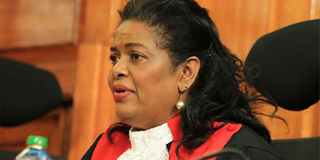Dissenting opinion showcases judge’s ability to pen a thriller in 21 days

Lady Justice Njoki Ndung'u at the Supreme Court before delivering a full judgment on reasons for nullification of President Kenyatta's re-election. PHOTO | JEFF ANGOTE | NATION MEDIA GROUP
What you need to know:
- Justice Njoki Ndung’u and Justice Ojwang declined to recuse themselves from hearing Justice Rawal’s appeal just because they had threatened to go on strike if she left before her 74th birthday.
- The good judge has a consistency of throwing up pleasant surprises, such as when she declined to attend a retreat and meetings as member of the Committee of Experts writing the Constitution in 2009.
Reading Lady Justice Njoki Ndung’u’s 440-page dissenting opinion in the presidential election petition is like collapsing John Kiriamiti’s My Life in Crime with My Life with a Criminal and adding a novella for dessert.
Even before dissenting, together with Prof Jackton Ojwang, in the petition filed by Raila Odinga against the declaration of Uhuru Kenyatta as President-elect, Justice Ndung’u holds the trophy for dissent in Kenya’s Supreme Court: She stepped out from the crowd when the other judges were writing the decision on whether or not Senate should participate in allocating revenue.
She disagreed with the majority when it decided that the Judges and Magistrates Vetting Board could not dig up the pasts of judicial officers beyond its jurisdiction. And she cleverly wrote a concurring opinion that really disagreed with the Supreme Court picking up election petitions when former Governor Evans Kidero challenged the upset of his victory.
Spunk is Judge Ndung’u’s middle name. Only last year, she granted a stay of the Court of Appeal decision to allow Deputy Chief Justice Kalpana Rawal to bid farewell to the Judiciary at 70 years.
STRIKE
Subsequently, she and Justice Ojwang declined to recuse themselves from hearing Justice Rawal’s appeal just because they had threatened to go on strike if she left before her 74th birthday.
Bar the occasional borrowing of passages from the Constitution and the law, as well as the affidavits in support of the petition together with responses, the judgment is a work of art rendered in flowing prose, complete with 123 pages of beautiful results tabulations.
It is raw brain sloshing in the rain. Much of it is heady stuff about constitutional principles and thrilling legal rules about elections, but the reader’s true reward lies in the affidavits being laid bare.
For example, the affidavit of elections boss Immaculate Kassait is noted as admitting only 35 alleged mistakes in vote results — easily explained as clerical, data entry, transcription or arithmetic errors.
SUPREME COURT
Not one to fear hard work, the judge rolled up her sleeves and went to work after the registrar of the Supreme Court had retired from the exertions of scrutinising over 4,299 documents. She personally examined 291 Form 34Bs and found that, in fact, forms from only 15 constituencies did not have bar code or serial number, likely because the returning officers were teetotalers. She also examined 1,349 Form 34As and found no problem with them. If one judge could do so much in such a short time, it begs the question why the judges did not want to count a single ballot to verify the claim by Winnie Guchu, as captured in dissenting decision, that vote difference between Mr Kenyatta and Mr Odinga had turned to currency in the region of 1,441,066/=.
PLEASANT SURPRISES
The good judge has a consistency of throwing up pleasant surprises, such as when she declined to attend a retreat and meetings as member of the Committee of Experts writing the Constitution in 2009. Her dissenting opinion, read together with Justice Ojwang’s 94-page treatise, exposes the law-breaking majority.
The ethnic hatreds sheathed beneath the sleeve of legalism have been laid bare in the dissenting opinions. Arguments hidden in poorly disguised jingoisms, with logic on sabbatical leave, stand embarrassed like the naked boy with a fish outside the Supreme Court.
The writer is a Programme Advisor, Journalists for Justice. The views expressed here are his own and do not reflect those of JFJ. [email protected]





